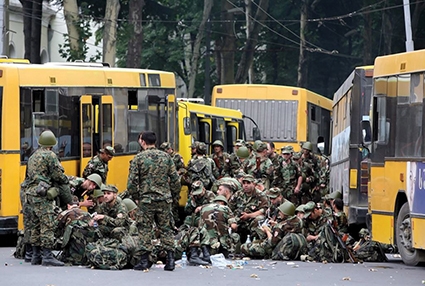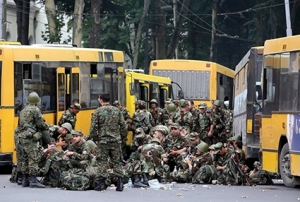On Education and the Sacred Duty of Defending One’s Motherland
By Eric Livny
The ISET Economist, a blog about economics in Georgia and the South Caucasus by the International School of Economics at TSU (ISET)
GEORGIA’S ‘DEAD SOULS’?
Rati, Lasha and Irakli are first year engineering students at the Georgian Technical University (GTU). Rather unusual students, one should add. At 22-23, all three are very much alive. Yet, they never attend classes and are not taking exams. BSc in engineering would be their third educational degree, yet neither one of them has any intention of completing his studies at GTU. And one more interesting detail: their ‘studies’ at GTU are paid for by the Georgian taxpayers because engineering (as well as mathematics and natural sciences) is considered to be a priority subject by the Georgian government.
To avoid any misunderstanding, Rati, Lasha and Irakli are not enrolled in a distance learning program offered by Georgia Tech. The trio simply found a hassle-free way to avoid the sacred duty of serving in the Georgian military.
50 WAYS TO LEAVE YOUR LOVER, AND 21 WAYS NOT TO SERVE YOUR COUNTRY
Georgia prides itself on the simplicity of its tax system. Simplicity and fairness, however, are not the most prominent features of Georgia’s “Military Duty and Military Service Law”. Nominally, all Georgian men aged 18 to 27 are “subject to performing compulsory military service” of 18 months. As straightforward as it gets. Yet, Article 30 (Deferment of Conscription) contains no less than 21 legal excuses to defer military service:
• Poor health condition (including mental health issues);
• Being an only child;
• Having one small child, or more than two kids of any age,
• Having a dependent sibling;
• Having a disabled family member
• Registering for the Unified National Examinations;
• Studying in a college or university (in Georgia or abroad);
• Being a priest of studying in a “theological school” (does not require taking the Unified National Examination!)
• Working as a teacher/doctor in a village;
• Having a doctoral degree and being engaged in academic research activities;
• Registering as a candidate for membership in the Parliament of Georgia
50 Ways To Leave Your Lover: by Paul Simon and Art Garfunkel
Just slip out the back, Jack
Make a new plan, Stan
You don't need to be coy, Roy
Just get yourself free
Hop on the bus, Gus
You don't need to discuss much
Just drop off the key, Lee
And get yourself free
Of particular interest is clause 30(n) which allows one to buy his freedom for a fee, currently set at 2,000 GEL per 18 months (payable until one reaches the age of 27). This option practically guarantees that no kid from Vake is ever forced to wear military uniform.
Finally, if, for some reason, none of the above legal excuses are applicable, one can be set free by decree (of the Georgian Prime Minister).
With so many holes in the law it is clear that the only people unfortunate enough to serve in the Georgian military are under-educated village boys who are not quick enough to reproduce. It is also quite obvious what kind of morale these boys have when they come to perform their duties.
THE WORST LAW EVER?
It is increasingly common across the OECD countries (and not only) to use the so-called Regulatory Impact Assessment (RIA) technique to critically assess laws and regulations. What one would normally do as part of a RIA exercise is analyze the costs and the distortionary effects of a regulation (say, licensing procedures for new medications) to its benefits (improved health outcomes).
|
LAW OF GEORGIA ON MILITARY DUTY AND MILITARY SERVICE Article 9 – Age of persons subject to compulsory military service “Citizens of Georgia aged from 18 to 27, who are registered or are obliged to be registered for conscription and who have no grounds to be released from conscription into compulsory military service, or to enjoy deferment from conscription, shall be subject to performing compulsory military service.” A back-of-the-envelope RIA of the Georgian Law on Military Duty and Military Service would inevitably conclude that this law is extremely ineffective. |
Generally, the main advantage of compulsory military service is that it enables countries to easily muster a large force (including reservists who went through military training as part of their compulsory service) in the event of a crisis. Additionally, one may argue that military service provides individuals with useful skills such as teamwork, discipline, stress management, etc.
The irony of it all is that Georgia’s Law on Military Duty and Military Service does NOT serve the very purposes for which it had been ostensibly drafted. The Georgian Armed Forces do not have much use for the vast majority of the poorly motivated village boys who end up being recruited. According to Defense Minister Tina Khidasheli, very few conscripts go through proper military training, comprising no more than 10% of total military personnel. Rather than readying for future combats or jobs, the remaining 90% are employed as free (unqualified) labor to guard Georgian prisons, military bases and government buildings.
Now, while failing to meet Georgia’s military needs, this law comes at a tremendous cost for Georgia’s national security, its human and social capital, and, ultimately, its economic development.
• First, it goes almost without saying that an army of illiterate and poorly motivated peasants is ill suited for the military and technological challenges of the 21st century: counter-terrorism, electronic warfare, drones, robots, long-range missiles and precision-guided weapons.
• Second, this law harms Georgia’s national ethos by incentivizing thousands of Georgian youth to cynically game the system (through useless studies, early reproduction, or fake suicide attempts). Horace, who thought that dying for one’s country is “sweet and beautiful”, would have never approved of a law teaching young people that civic duties are not to be taken seriously. Yet, this is what the Georgian Law on Military Duty and Military Service does.
• Third, by segregating the Georgian people into ‘haves’ and ‘have nots’ the law misses a huge opportunity to bolster the country’s scarce social capital. Having immigrated to Israel at 13, I started feeling a proud Israeli citizen only when I wore the military uniform of an elite paratrooper unit. Given its complicated ethnic and social mosaic, Georgia could also use its military (and/or an obligatory civil service) as a melting pot in which people from all walks of life would learn to live with each other and form broader social and professional networks. This is not something to be taken lightly. Georgians tend to cluster in family groups and clans, and many of the country’s challenges – in business, politics and government – stem from people’s limited ability to let go of these primitive parochial bonds.
• Fourth, the purely economic costs of this law go well beyond a few lari pocketed by Georgian Technical University. Rati, Lasha and Irakli in our example are learning nothing at all, but most Georgian students are also learning very little because Georgian universities and colleges are not facing competitive pressure to improve and deliver a good educational product. The product they happily sell (and students buy) consists of a piece of paper (“diploma”) certifying that its holder is not as bad as underprivileged village boys and girls, and a legal excuse not to serve in Georgia’s peasant army.
• Finally, the threat of military service provides young people with the wrong motive to acquire a degree (any). It occurs to me that 18 months of military service (especially of the kind that I went through in Israel) are, in fact, a very small price to be paid compared to 4 years of being lectured by Soviet-trained professors pretending to teach marketing or management, and/or being stuck in the wrong profession for the rest of one’s life.
Fundamentally, Georgia faces the choice of going for a compulsory Israeli-style national military (or civic) service or opting for a small American-style professional army of volunteers. Both options have their pros and cons. One thing is clear, however: Georgia cannot afford staying with the current law, which fails to achieve its stated objectives while undermining Georgia’s great nation-building and modernization project.
ARMY AS A HOTBED OF INNOVATION
As Georgia is thinking through its future strategy, it may just as well look to the experience of other countries in using their military to jump start economic and social development.
A key point is that education and military service can go hand-in-hand. Some of the best professional armies in the world – America being a strong example in this case – require their officer corps to have an education. In the US, colonels have to have a master’s degree and the highest-ranking generals have PhDs. By funding the education of its officers, not only would the Georgian military become on the whole smarter and more capable, it would also be seen as an employment destination for some of the brightest young men and women.
Moreover, this model doesn’t have to apply only to aspiring battlefield commanders. A good military has excellent engineering, healthcare, diplomatic, and legal structures as well. For example, Israeli military’s IT and elite intelligence units have long become recognized as hotbeds of technological talent, as reflected in headlines like ”From Israeli Army Unit 8200 To Silicon Valley”. On the one hand, these units recruit the best young minds through a very competitive process (people, both men and women, compete to get in, not to get out!). On the other, they supply Israel’s Start Up Nation with whole teams of experienced developers, professional networks, and ideas.
Georgia certainly has the raw individual talent, but to make good on its promise as a nation it has to urgently fix ineffective laws and institutions, such as its military and universities.
The author is President at Tbilisi’s International School of Economics (ISET) and Advisor to Georgian Minister of Economic and Sustainable Development.












